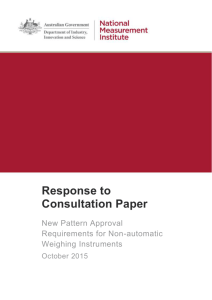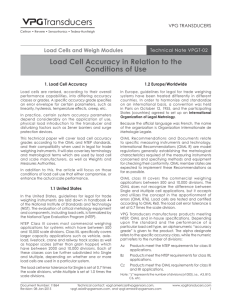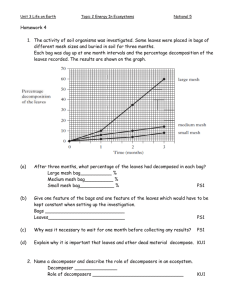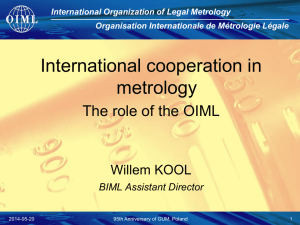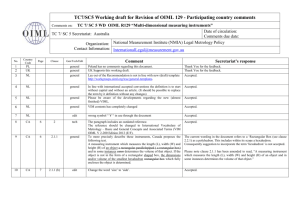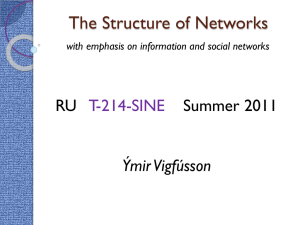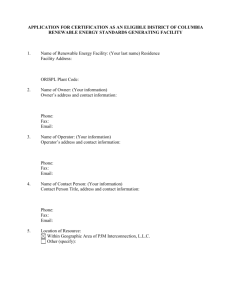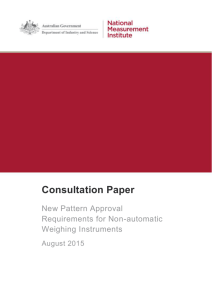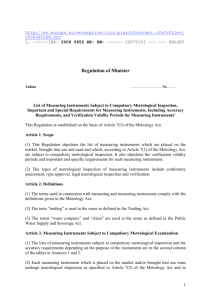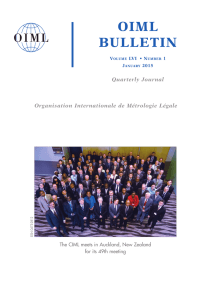Physikalisch-Technische Bundesanstalt
advertisement
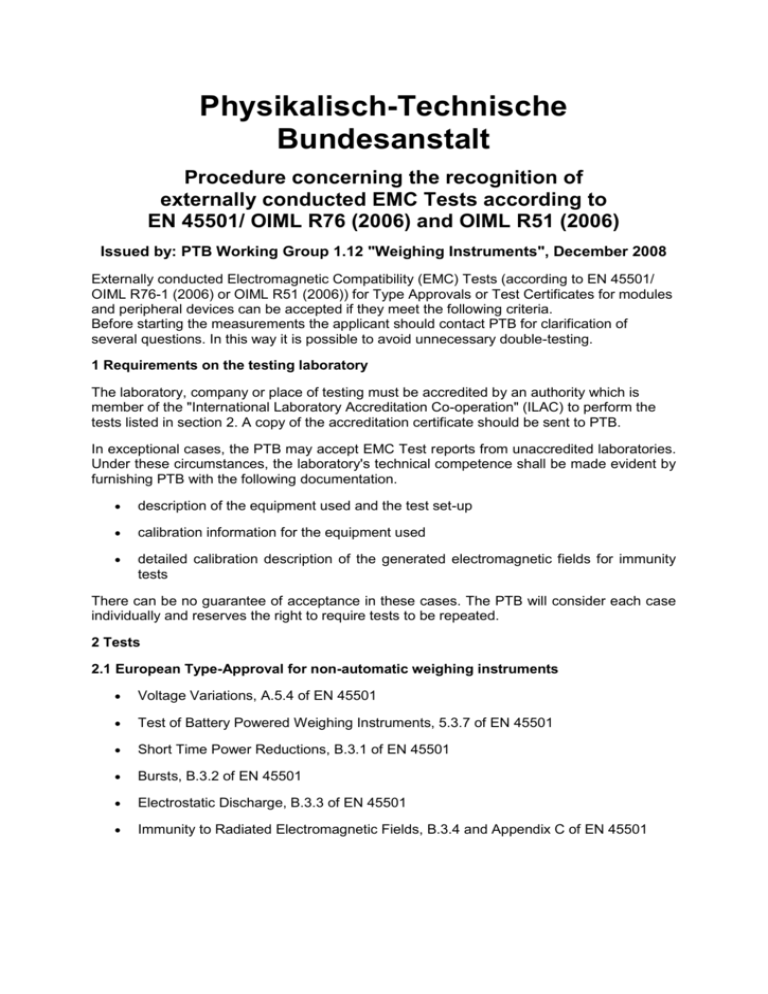
Physikalisch-Technische Bundesanstalt Procedure concerning the recognition of externally conducted EMC Tests according to EN 45501/ OIML R76 (2006) and OIML R51 (2006) Issued by: PTB Working Group 1.12 "Weighing Instruments", December 2008 Externally conducted Electromagnetic Compatibility (EMC) Tests (according to EN 45501/ OIML R76-1 (2006) or OIML R51 (2006)) for Type Approvals or Test Certificates for modules and peripheral devices can be accepted if they meet the following criteria. Before starting the measurements the applicant should contact PTB for clarification of several questions. In this way it is possible to avoid unnecessary double-testing. 1 Requirements on the testing laboratory The laboratory, company or place of testing must be accredited by an authority which is member of the "International Laboratory Accreditation Co-operation" (ILAC) to perform the tests listed in section 2. A copy of the accreditation certificate should be sent to PTB. In exceptional cases, the PTB may accept EMC Test reports from unaccredited laboratories. Under these circumstances, the laboratory's technical competence shall be made evident by furnishing PTB with the following documentation. description of the equipment used and the test set-up calibration information for the equipment used detailed calibration description of the generated electromagnetic fields for immunity tests There can be no guarantee of acceptance in these cases. The PTB will consider each case individually and reserves the right to require tests to be repeated. 2 Tests 2.1 European Type-Approval for non-automatic weighing instruments Voltage Variations, A.5.4 of EN 45501 Test of Battery Powered Weighing Instruments, 5.3.7 of EN 45501 Short Time Power Reductions, B.3.1 of EN 45501 Bursts, B.3.2 of EN 45501 Electrostatic Discharge, B.3.3 of EN 45501 Immunity to Radiated Electromagnetic Fields, B.3.4 and Appendix C of EN 45501 -2- 2.2 OIML Certificates Voltage Variations, A.5.4 of OIML R76-1 (2006) or A.6.2.4 to A.6.2.7 of OIML R51 (2006) Short Time Power Reductions, B.3.1 of OIML R76-1 (2006) or A.6.3.1 of OIML R51 (2006) Bursts, B.3.2 of OIML R76-1 (2006) or A.6.3.2 of OIML R51 (2006) Surge, B.3.3 of OIML R76-1 (2006) or A.6.3.3 of OIML R51 (2006) Electrostatic Discharge, B.3.4 of OIML R76-1 (2006) or A.6.3.4 of OIML R51 (2006) Electromagnetic immunity, B.3.5 and B.3.6 of OIML R76-1 (2006) or A.6.3.5 of OIML R51 (2006) 3 Test Procedures Tests for non-automatic weighing instruments must be carried out according to EN 45501 for EC Type-Approval Certificates or OIML R76-1 (2006) for OIML Certificates. Other test procedures cannot be accepted. Peripheral devices (5.4.2 of EN 45501 and OIML R76 (2006)) shall be connected to every possible interface when performing the tests of Annex B.3 of EN45501 and OIML R76 (2006) and A.6.3 of OIML R51 (2006). At least a cable specified from manufacturer with a minimal length of 2 m (maximal length 3 m ) must be connected. The indicator shall be adjusted to the minimum signal per (verification) scale interval. It shall be taken into account that not the indicator is the object of the test but a weighing instrument of which the indicator forms a part. This means that during the EMC tests a load receptor equipped with a high-impedance load cell shall be connected and, during the test according to B.3.4 of EN45501 (or B.3.5 and B.3.6 of OIML R76-1 (2006) or A.6.3.5 of OIML R51 (2006)), shall be placed within the field. The most simple solution is a single point load cell or another load cell that can be loaded with a small load (equivalent to 20 to 50 e). By no means an HF choke coil, or a similar shielding means, may be applied on the cable between load cell and indicator. Otherwise this measure shall be part of all instruments of the series. With test for sensitivity against electromagnetic fields according to IEC 61000-4-3 the cable shall be placed in parallel to and on the edge of the uniform area facing the antenna. All other cables (interfaces) shall be placed there too. The indicator shall be equipped with the maximum number of interfaces and cables shall be connected to all interface connectors. Tests for automatic weighing instruments must be performed according to OIML R51 (2006). If applicable, tests for susceptibility against disturbances in electrical networks of road vehicles in accordance with OIML R51 (2006), A.6.3.6.1 must include pulse 5a recently introduced into ISO 7637-2. With belt weighers having a one channel displacement transducer the minimum totalised load must be totalised during the EMC tests if the flowrate changes due to disturbance. Since that leads to a very high time expense the one channel displacement transducer design is not recommendable. 4 EMC Test Report The report shall at least contain the following: proof of accreditation for the place of testing list of all equipment used with the date and place of their last calibration. explanation of the test fundamentals -3 detailed description of the equipment tested with accessories and auxiliary devices description of the test set-up with photos and/or diagrams (including details like the placement of the cables); also details, such as e.g. arranging the cables must be visible; with the tests on sensitivity to bursts and electrostatic discharges photos must supply prove that the minimum distances to walls and metallic structures have been kept. description of the test procedure and specific test conditions assessment of the test results for each test performed length of wait at each frequency step for electromagnetic immunity test. This length is dependent on the reaction time of the Instrument Under Test and should not be less than 3 seconds. date, time, temperature, rel. humidity, and pressure for each test performed report must be presented in German or English If EMC test results of NAWIs are to be adopted for AWIs, then EN 45501 / OIML R761, T.5.5.6, last hyphen does not apply, i.e. also transient changes of the displayed weight due to disturbance may not occur. Otherwise the test in question shall be repeated while the program generating the measuring value in automatic mode is running. 5 Record of Test Results The test results, recorded in their appropriate OIML R76-2 format or R51-2, respectively, shall be appended to the test report. The OIML forms shall be completed in full. Blank forms can be obtained from the PTB Working Group 1.12.
